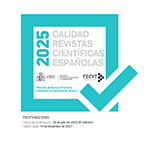Sherlock-wannabes or when the audience fact-checks. How ideology, education, and alternative media use explain fact-checking behaviors in Chile
Abstract
When confronted with suspicious information, the most common advice is to rely on trusted, well-known news media outlets to verify it. However, in a high-choice, fragmented media ecosystem, news readers might easily find a source that confirms what they previously thought about an issue, or debunks reports that challenge their values and beliefs. As such, alternative news outlets might be a feasible venue for citizens to confront cross-cutting information. At the same time, avoiding contrary information or actively seeking different points of view depends on personal characteristics, such as ideology or education. Drawing upon the belief gap hypothesis, this study observes how alternative news media use, together with people’s education and political ideology, affect citizens’ fact-checking behaviors when encountering challenging information. Results from a two-wave panel study conducted in Chile suggest that ideology plays a role only for the highly educated, who tend to fact-check the most when they are closer to the left side of the political spectrum.
Downloads
Article download
License
In order to support the global exchange of knowledge, the journal Estudios sobre el Mensaje Periodístico is allowing unrestricted access to its content as from its publication in this electronic edition, and as such it is an open-access journal. The originals published in this journal are the property of the Complutense University of Madrid and any reproduction thereof in full or in part must cite the source. All content is distributed under a Creative Commons Attribution 4.0 use and distribution licence (CC BY 4.0). This circumstance must be expressly stated in these terms where necessary. You can view the summary and the complete legal text of the licence.










